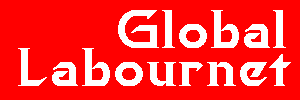
The Labour Movement and the Internet
An independent, online newsletter serving the trade union movement.
Edited by Eric Lee.

9 July 1997
International Transport Workers' Federation Launches British Airways Strike Website
We received the following statement today from the International Transport Workers Federation, an organization which pioneered trade union use of computer networking as early as the mid-1980s and which continues today to show the way:
(London, 8 July 1997) David Cockroft General Secretary of the International Transport Workers Federation, the global union body which organises civil aviation workers in almost every major airline and airport in the world, today expressed his disappointment that British Airways is set on a dispute which appears only to be aimed at breaking a trade union.
Cockroft says: "This dispute is about basic rights. It is about a company saying to its workers 'we are going to increase your work hours and lower your pay, and take it or leave it. When employees have objected the company has responded with threats and intimidation of a kind which have never been experienced before in the airline".
"Let us have no doubts. British Airways is now engaged in the most highly organised, and well funded union busting operation ever seen in the airline industry anywhere in the world." he said.
Last November civil aviation unions from around the world agreed to designate the BA dispute as an International Strategic Priority. This is the first time a dispute has been designated in this way and reflects the importance that all unions attach to the dispute.
A number of unions are certainly preparing a range of actions against BA strike-breaking.
But unions are also aware of the need to give assistance to stranded BA passengers. According to Cockroft: " Union passenger assistance teams are being organised in major world airports. Cabin crew unions will be making contact with passengers at BA check in desks and assisting them with advice and assistance in making alternative travel arrangements. They will, of course, also explain to them the causes of this dispute."
The ITF has also set up an internet web page for information on the dispute at: http://www.itf.org.uk/british-airways-strike.html.
21 June 1997
Cyber-campaign in support of fired workers in UK
The Communications Workers Union in Britain sent us the following message today:A Rally in support of the 31 sacked workers at Critchley Labels in South Wales - all members of the Communication Workers Union sacked for defending trade union rights - will take place at Critchley Label Technology's Croespenmaen factory, Unit 3 Oakwood Close, Pen-Y-Fan Industrial Estate, Crumlin, near Newport, at 1:00pm on Wednesday 25 June.
Defenders of trade union rights and concerned citizens are urged to contact the Critchley Group of companies on Wednesay 25 June to express their support for the sacked workers and to call for their re-instatement to full employment rights.
Critchley's e-mail address in the UK is critchleycomponents@dial.pipex.com
Some other useful addresses in North America are:
General E-Mail: karens@critchley.com
Technical Support: steves@critchley.com
Business Office E-Mail: scots@critchley.com
Full details and background briefings of the Critchley workers' struggle
can be found at
http://www.cwu.org
http://www.labournet.org.uk/
http://www.btinternet.com/~donald.macdonald/critch7.htm
17 June 1997
The Labour Channel --
First Trade Union Use of "Push" Technology
We've all heard about the new "push" technology on the Internet. Wired magazine went so far as to shout "throw your old browsers away!" But until now, no one has used the technology in the labour movement.The launch of The Labour Channel on PointCast Network earlier this month is the first use of this approach to computer mediated communications by the labour movement and in this brief article we want to explain its significance.
Push technology (also, and more accurately known as "smart pull") is simply the scheduled retrieval of pre-selected web pages. In other words, you tell your browser program "this is what interests me" and it goes out and brings back the newly updated pages that you wanted. No more "surfing" endlessly during the World Wide Wait. The pages arrive, are loaded into your computer's hard disk, and you can disconnect. Then, at your leisure, without paying further telecommunications costs, you can read the pages you've downloaded. These pages are full HTML files, and can include pictures, sound, etc.
So far, so good. I'm sure that individual trade unions and labour publications are going to discover this quickly, now that PointCast Connections has opened, using the open standard called Channel Definition Format (CDF). As of a few days ago, Netscape Communicator 4.0 also offers a solution, called Netcasting, which is currently incompatible with CDF. Microsoft's Internet Explorer 4.0 (now in beta testing) will work with the CDF approach when it is finally released this summer.
The Labour Channel offers a single channel solution for online trade union newsletters and others. By subscribing to that one channel, there will be no need to race around collecting dozens of CDF files, one for each publication. And trade unions which choose to go along with The Labour Channel approach -- which costs them nothing -- need only provide a URL for the their newsletter and a link back to the main subscription page for the channel from their website. The push technology embedded in the browser software does the rest, updating subscribers' hard disks as the various trade union sites are updated.
Currently The Labour Channel is offering:
- Union Summer's home page from the AFL-CIO
- The Labour Website of the Week
- New Books at Labour's Online Bookstore
- Recommended Titles at Labour's Online Bookstore
- NATCA Voice - a US trade union publication
For more information on The Labour Channel, click here.
May 1997 / April 1997 / March 1997 / February 1997 / January 1997
December 1996 / November 1996
Home
Back to Eric Lee's home page.
Back to Solinet.
Copyright 1997 by Eric Lee.
| Member of the Internet Link Exchange |


